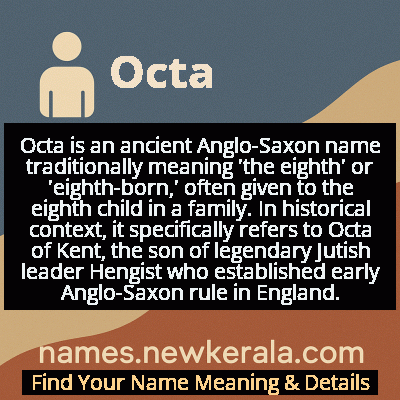Octa Name Meaning & Details
Origin, Popularity, Numerology Analysis & Name Meaning of Octa
Discover the origin, meaning, and cultural significance of the name OCTA. Delve into its historical roots and explore the lasting impact it has had on communities and traditions.
Name
Octa
Gender
Male
Origin
Anglo
Lucky Number
3
Meaning of the Name - Octa
Octa is an ancient Anglo-Saxon name traditionally meaning 'the eighth' or 'eighth-born,' often given to the eighth child in a family. In historical context, it specifically refers to Octa of Kent, the son of legendary Jutish leader Hengist who established early Anglo-Saxon rule in England.
Octa - Complete Numerology Analysis
Your Numerology Number
Based on Pythagorean Numerology System
Ruling Planet
Jupiter
Positive Nature
Optimistic, inspirational, and creative.
Negative Traits
Scattered, exaggerating.
Lucky Colours
Yellow, gold, purple.
Lucky Days
Thursday.
Lucky Stones
Yellow sapphire.
Harmony Numbers
1, 2, 9.
Best Suited Professions
Arts, writing, communication.
What People Like About You
Creativity, optimism.
Famous People Named Octa
Octa of Kent
Anglo-Saxon ruler
Legendary early king of Kent who succeeded his father Hengist and established the Kentish royal line
Octa FitzHengist
Historical figure
Mentioned in early chronicles as continuing his father's legacy in Kentish leadership
Octa the Jute
Warrior leader
Led Anglo-Saxon settlements in Britain following the Roman withdrawal
Name Variations & International Equivalents
Click on blue names to explore their detailed meanings. Gray names with will be available soon.
Cultural & Historical Significance
The name symbolizes the transition from legendary migration-era leaders to established Anglo-Saxon royalty, bridging the gap between continental Germanic traditions and the emerging English identity. In Anglo-Saxon culture, names like Octa that referenced birth order were common and reflected practical naming conventions alongside deeper cultural values of lineage and family structure. The preservation of Octa's name in historical records demonstrates the importance of dynastic continuity in early English society and provides a tangible link to the foundational myths of English nationhood.
Extended Personality Analysis
Individuals named Octa are typically perceived as carrying a sense of historical gravitas and traditional values. They often exhibit strong leadership qualities, determination, and a connection to heritage, reflecting the name's royal Anglo-Saxon origins. These individuals tend to be practical, grounded, and methodical in their approach to life, with a natural inclination toward responsibility and legacy-building. The numerical association with 'eight' in the name's meaning often translates to personality traits of balance, organization, and a systematic approach to challenges.
Octas are frequently seen as reliable and steadfast, with a quiet confidence that comes from understanding their place in larger historical or family narratives. They may possess a strong sense of duty and tradition, combined with the innovative spirit needed to adapt ancient values to modern contexts. Their personality often blends the warrior spirit of their namesake with diplomatic skills necessary for maintaining relationships and building communities. This combination of traditional strength and adaptive intelligence makes them effective in roles requiring both preservation of values and navigation of changing circumstances.
Modern Usage & Popularity
In contemporary times, Octa is an extremely rare given name, primarily used by families with strong interests in Anglo-Saxon history or those seeking unique historical names. It sees occasional use in academic circles, historical reenactment communities, and among genealogy enthusiasts tracing Anglo-Saxon heritage. The name has never ranked in modern baby name databases and remains largely confined to scholarly references and historical fiction. However, there's a minor resurgence among parents looking for distinctive names with deep historical roots, particularly in Britain and among diaspora communities interested in early English history. Its usage is almost exclusively male and maintains its connection to English heritage rather than being adopted by other cultural groups, preserving its specific historical and cultural associations.
Symbolic & Spiritual Meanings
Symbolically, Octa represents continuity, legacy, and the foundation of dynasties. As the name of Hengist's son and successor, it embodies the transition of power and the establishment of lasting institutions. The numerical association with eight carries additional symbolism of balance, renewal, and cosmic order across various cultural traditions. In numerology, eight represents authority, practicality, and material success, aligning with Octa's historical role as a ruler. The name also symbolizes the blending of Germanic warrior culture with the administrative demands of kingdom-building, representing both martial strength and governance. As an early Anglo-Saxon name, it serves as a symbolic bridge between the migration period and settled English society, embodying the transformation from wandering warriors to established rulers with territorial claims and dynastic ambitions.

